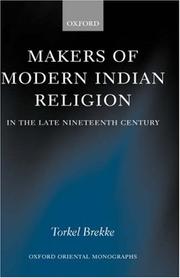
Makers of modern Indian religion in the late Nineteenth Century
By Torkel Brekke
Subjects: Religion, India, religion
Description: "During the nineteenth century there took place a complete transformation of Indian religions. If we wish to understand the increasingly important political role of religion in South Asia in our times, this is the period where our investigation should start. On the one hand, there took place a fundamental conceptual transformation in the world of religion among Indians who were exposed to English language and culture. This transformation crystallized religious communities with sharp boundaries and distinct histories. On the other hand, the emerging feeling of religious-communal identity motivated religious and lay leaders to work in the interest of the community. This book, built around case studies, is about both of these interrelated developments. Dr. Brekke looks at religious leaders from three very different milieus: the Hindus of Bengal, the Buddhists of Sri Lanka, and the Jains of Western India. These three religious groups constitute an interesting collection because they are linked in two significant ways. Firstly, in the minds of the leaders whom Brekke discusses, these traditions were intimately linked through their history. According to Western Indology, Hinduism, Buddhism, and Jainism had common origins: Buddhism and Jainism were branches which had sprung from the great tree of Hinduism. Thus, in a significant sense, Buddhists and Jains were Hindus. Together these three traditions constituted the indigenous Indian religions. Secondly, the three became linked in the middle of the 1890s through personal contacts, especially at the Parliament of Religions in 1893."--BOOK JACKET.
Comments
You must log in to leave comments.